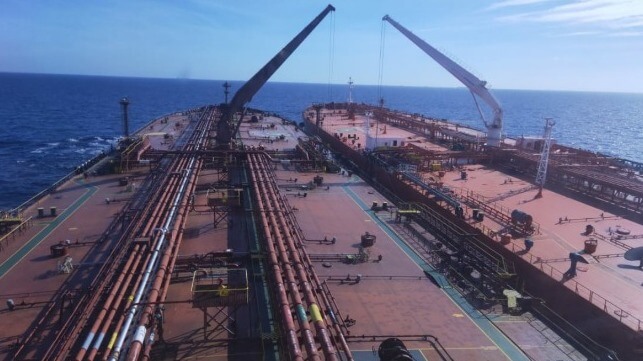Spain Tries to Regulate Ship-to-Ship Tanker Transfers in Int'l Waters

Spain has enacted a national regulation aimed at restricting ship-to-ship oil transfers outside of its 12-mile line, effectively extending Spanish authority into international waters.
The area off the Spanish exclave of Ceuta is one of two main hubs for Russian oil transfers in Europe. Aframaxes and Suezmaxes carrying oil from Russia's Baltic ports transit to a meeting area off Ceuta, where they raft up with larger VLCCs and transfer their cargo at sea. The arrangement supports long-haul shipments to Asia, where buyers have a strong interest in Russian petroleum. Similar transfer patterns have developed for Russian-origin fuel cargoes, and are often used to disguise the cargo's origin for purposes of sanctions evasion.
The high-seas transfers have captured the attention of Spanish regulators, who are concerned that the aging "dark fleet" tankers that move much of Russia's petroleum could spill oil offshore without any accountability for the cost of cleanup. In a move to crack down on these transshipment operations, Spain has enacted a new regulation empowering port captaincies to oversee anchorage operations in "Spanish maritime spaces" outside of Spain's territorial seas. These new "spaces" include the contiguous zone (12-24 nm from shore) and the exclusive economic zone (24-200 nm), where coastal states have limited jurisdiction under UNCLOS.

that matters most
Get the latest maritime news delivered to your inbox daily.
The regulation requires tanker operators to ask for permission from the nearest Spanish port captaincy if they wish to anchor within "Spanish maritime spaces" outside of the Spanish territorial sea, and it imposes strict requirements for safety during the anchorage period. If the tanker operator complies, they are required to charter a salvage tug with spill response gear throughout their stay. The regulation leaves out STS transfers conducted without anchoring, a common practice seen in the recent case of the Maersk Magellan.
Under international law, coastal states do not have unilateral authority to regulate navigation outside of the 12-mile line, with limited exceptions. Recognizing the limits of its own national jurisdiction, Spain will soon petition the IMO to "give us instruments to prevent the transfer of Russian crude from ship to ship . . . in front of Ceuta," a transport ministry source told El Mercantil.
